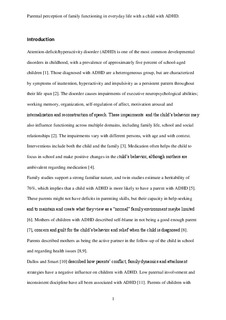| dc.description.abstract | Aim: The aim of this study was to describe and investigate family characteristics in relation to support, behaviour of the child, family functioning and sense of coherence from the parents’ perspective in families with a child with attention deficit hyperactivity disorder (ADHD). A further aim was to explore predictors of family functioning. Methods: The study population consisted of 1964 parents of children with ADHD aged 15 years old and younger. In all, 265 parents responded to a questionnaire (response rate 48.2%; 217 mothers and 48 fathers). In addition to questions about the parents, children, family characteristics and support from health services, the questionnaire included the Family Assessment Device (FAD), the Strengths and Difficulties Questionnaire (SDQ), Sense of Coherence (SOC) and Social Cohesion and Support Index (SCS). Data were analysed with descriptive, comparative and standard multiple regression analyses. Results: Parents with ADHD reported a weaker SOC and poorer FAD in the family than parents without ADHD. Parents with children medicated for ADHD were significantly more satisfied with social support (SCS), rated their children’s behaviour as less problematic and reported better family functioning. Parents’ age, SOC, SCS, SDQ and support from the community health services explained 46.2% of the variation in FAD. Conclusions: A strong SOC, social support and support from the community health services were strongly associated with a positive effect on family functioning. Parents with ADHD reported a weaker SOC and poorer family functioning than parents without ADHD. This knowledge may be useful and should be taken into account when planning support for such families. | nb_NO |
